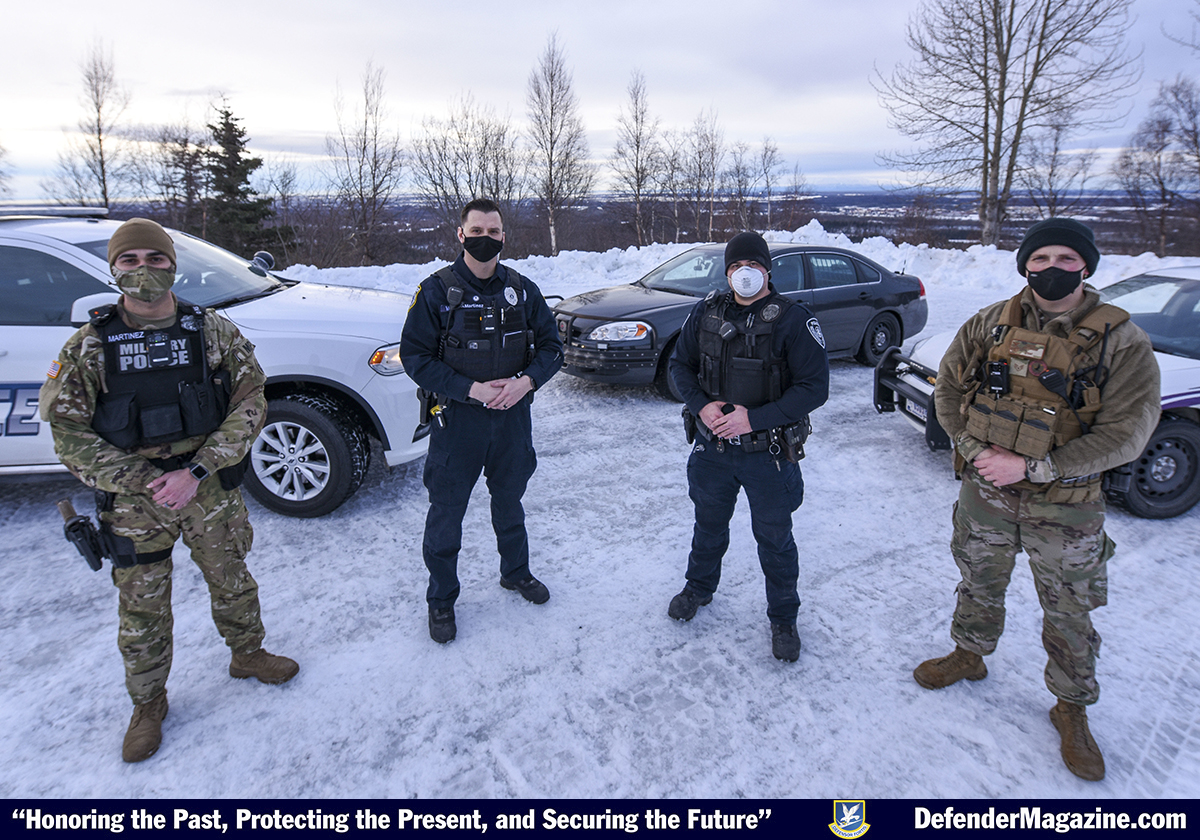JOINT BASE ELMENDORF-RICHARDSON, Alaska, – The evolving partnership between the 673d Security Forces Squadron and Anchorage Police Department has continued to develop over the past few years leading to noticeable benefits for the entire community.
“On a daily basis, our patrol officers engage with JBER’s security forces in a variety of complimentary ways,” said Chief Justin Doll, APD Chief of Police. “For example, our partnership has allowed JBER security forces to have a greater role in the prosecution of criminal incidents that take place on base, which is great for the operational effectiveness of security forces and allows APD patrol officers to spend more time focusing their efforts in neighborhoods around town.”
The impact of this partnership in this particular location is very significant because as communities, JBER and Anchorage overlap in many ways.
“Subsequently there is a large mixture of citizens and military in Anchorage, I think it’s good for the community to see APD and JBER PD working together because when something happens in Anchorage it could end up on JBER, and vice versa,” said Officer Joey Giammalva, with APD. “Because we have been able to develop a good working relationship with JBER’s defenders throughout my time on APD, I have been able to reach out to officers on JBER, and them to me as a resource for help or information.”
Some recent added examples of JBER officers and APD assisting one another include but are not limited to; catching a reckless motorcycle on the Glenn Hwy at speeds of over 100+ mph, finding and stopping a stolen vehicle, finding and arresting a drunk driver, and making arrests on wanted individuals.
“Joint jurisdiction is beneficial in that both entities can work together on issues that arise affecting both JBER and Anchorage,” said Chief Doll. “An example of this is the interdiction, arrest, and prosecution of impaired drivers. This is an important safety issue both on and off the base, and usually has a component of both. APD and JBER Security Forces have made huge improvements in the handling of these cases over the last couple of years.”
Joint jurisdiction allows officers from APD and JBER to work together and assist each other during incidents, which, without joint jurisdiction, the agency would be handling the incident on their own.
“Being able to work together on critical or dangerous incidents makes it safer for the individuals, citizens, and officers involved,” said Officer Giammalva. “Now there are more people and resources available to help resolve the incident as peacefully as possible.”
Memorandums of Understanding (MOU) are the framework that defines each of the respective agency’s roles, and serves as a guide as they continue to work together to build an effective operational partnership.
“Having effective MOU’s and clear lines of communication let us resolve potential issues ahead of time, and more importantly, make problem solving during critical incidents much easier,” said Chief Doll. “In the past, we have had infrequent critical incidents on JBER where the APD SWAT team was able to respond and help resolve them, which is on the high profile end of the spectrum.”
Another benefit to partnership and working towards open lines of communication is the cross-training opportunities for both entities.
“Since JBER has a civilian law enforcement component to their Security Forces Squadron, there is substantial overlap in training programs that can be leveraged to take advantage of each agency’s strengths,” said Chief Doll. “We have been successfully doing this by partnering to use training facilities, and allowing JBER service members to attend the APD Police Academy.”
One of the very unique training opportunities that exists, due to the healthy working relationship between departments, is that a few select members from JBER’s SFS are able to attend APD’s six month basic police academy and learn how the other department works and operates daily.
“The training not only increases cohesion between departments, but enables those military members to come back and spread the knowledge and skills they have acquired during the concentrated academy,” said U.S. Air Force Staff Sgt. Alexander Peppers, a 673 SFS patrolman and recent graduate of the academy. “Because Security Forces has such a broad range of responsibilities in the Air Force, it can be challenging to focus specifically on law enforcement. Just as in any profession, more training increases effectiveness and efficiency. Knowing how each department handles different incidents enables both parties to operate more smoothly. Law enforcement relies on trust, so the more contact and incidents we resolve together, helps to build that trust moving forward.”
Having a strong working relationship and additional training opportunities not only enables clear communication, but ensures effective plans can be established for when there are dangerous or hostile incidents. These plans ensure everyone knows their role and how to safely execute operations and counter any unexpected threats to civilian personnel or military assets.
“Effective policing requires teamwork…I believe APD and JBER Security Forces are the embodiment of effective teamwork between departments with shared jurisdiction,” said U.S. Air Force Lt. Col. Gilbert S. Wyche ll, Commander of the 673d SFS. “Whether it is a 911 call routed through APD to JBER’s Emergency Operations Center or vice versa, joint operations at entry control points, shared jurisdiction over a security incident or joint training together…the teamwork yields a safer community for all of Anchorage.”
By Staff Sgt. Crystal A. Jenkins 673 ABW/PA
Feb. 8, 2021

